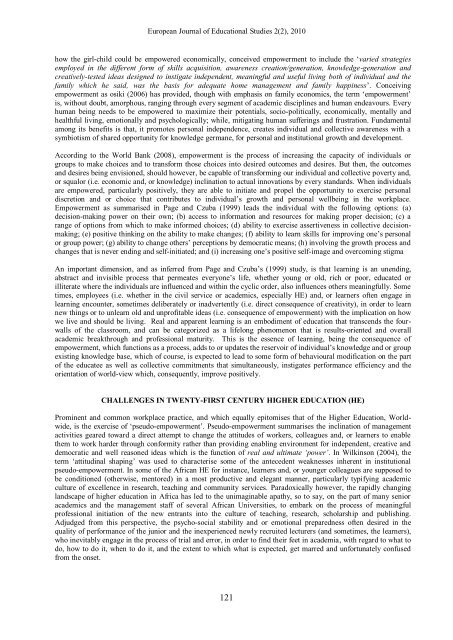Educational - Ozean Publications
Educational - Ozean Publications
Educational - Ozean Publications
Create successful ePaper yourself
Turn your PDF publications into a flip-book with our unique Google optimized e-Paper software.
European Journal of <strong>Educational</strong> Studies 2(2), 2010how the girl-child could be empowered economically, conceived empowerment to include the „varied strategiesemployed in the different form of skills acquisition, awareness creation/generation, knowledge-generation andcreatively-tested ideas designed to instigate independent, meaningful and useful living both of individual and thefamily which he said, was the basis for adequate home management and family happiness‟. Conceivingempowerment as osiki (2006) has provided, though with emphasis on family economics, the term „empowerment‟is, without doubt, amorphous, ranging through every segment of academic disciplines and human endeavours. Everyhuman being needs to be empowered to maximize their potentials, socio-politically, economically, mentally andhealthful living, emotionally and psychologically; while, mitigating human sufferings and frustration. Fundamentalamong its benefits is that, it promotes personal independence, creates individual and collective awareness with asymbiotism of shared opportunity for knowledge germane, for personal and institutional growth and development.According to the World Bank (2008), empowerment is the process of increasing the capacity of individuals orgroups to make choices and to transform those choices into desired outcomes and desires. But then, the outcomesand desires being envisioned, should however, be capable of transforming our individual and collective poverty and,or squalor (i.e. economic and, or knowledge) inclination to actual innovations by every standards. When individualsare empowered, particularly positively, they are able to initiate and propel the opportunity to exercise personaldiscretion and or choice that contributes to individual‟s growth and personal wellbeing in the workplace.Empowerment as summarised in Page and Czuba (1999) leads the individual with the following options: (a)decision-making power on their own; (b) access to information and resources for making proper decision; (c) arange of options from which to make informed choices; (d) ability to exercise assertiveness in collective decisionmaking;(e) positive thinking on the ability to make changes; (f) ability to learn skills for improving one‟s personalor group power; (g) ability to change others‟ perceptions by democratic means; (h) involving the growth process andchanges that is never ending and self-initiated; and (i) increasing one‟s positive self-image and overcoming stigmaAn important dimension, and as inferred from Page and Czuba‟s (1999) study, is that learning is an unending,abstract and invisible process that permeates everyone‟s life, whether young or old, rich or poor, educated orilliterate where the individuals are influenced and within the cyclic order, also influences others meaningfully. Sometimes, employees (i.e. whether in the civil service or academics, especially HE) and, or learners often engage inlearning encounter, sometimes deliberately or inadvertently (i.e. direct consequence of creativity), in order to learnnew things or to unlearn old and unprofitable ideas (i.e. consequence of empowerment) with the implication on howwe live and should be living. Real and apparent learning is an embodiment of education that transcends the fourwallsof the classroom, and can be categorized as a lifelong phenomenon that is results-oriented and overallacademic breakthrough and professional maturity. This is the essence of learning, being the consequence ofempowerment, which functions as a process, adds to or updates the reservoir of individual‟s knowledge and or groupexisting knowledge base, which of course, is expected to lead to some form of behavioural modification on the partof the educatee as well as collective commitments that simultaneously, instigates performance efficiency and theorientation of world-view which, consequently, improve positively.CHALLENGES IN TWENTY-FIRST CENTURY HIGHER EDUCATION (HE)Prominent and common workplace practice, and which equally epitomises that of the Higher Education, Worldwide,is the exercise of „pseudo-empowerment‟. Pseudo-empowerment summarises the inclination of managementactivities geared toward a direct attempt to change the attitudes of workers, colleagues and, or learners to enablethem to work harder through conformity rather than providing enabling environment for independent, creative anddemocratic and well reasoned ideas which is the function of real and ultimate ‘power’. In Wilkinson (2004), theterm „attitudinal shaping‟ was used to characterise some of the antecedent weaknesses inherent in institutionalpseudo-empowerment. In some of the African HE for instance, learners and, or younger colleagues are supposed tobe conditioned (otherwise, mentored) in a most productive and elegant manner, particularly typifying academicculture of excellence in research, teaching and community services. Paradoxically however, the rapidly changinglandscape of higher education in Africa has led to the unimaginable apathy, so to say, on the part of many senioracademics and the management staff of several African Universities, to embark on the process of meaningfulprofessional initiation of the new entrants into the culture of teaching, research, scholarship and publishing.Adjudged from this perspective, the psycho-social stability and or emotional preparedness often desired in thequality of performance of the junior and the inexperienced newly recruited lecturers (and sometimes, the learners),who inevitably engage in the process of trial and error, in order to find their feet in academia, with regard to what todo, how to do it, when to do it, and the extent to which what is expected, get marred and unfortunately confusedfrom the onset.121
















